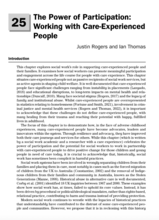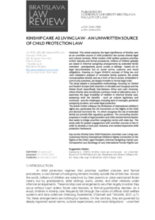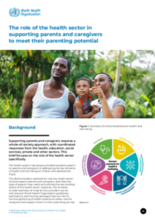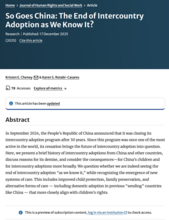Displaying 21 - 30 of 4431
This chapter in the book, Social Work Reflections, explores social work’s role in supporting care-experienced people and their families. It examines how social workers can promote meaningful participation and engagement across the life course for people with care experience.
Learn how this curriculum can help you address critical challenges faced by children on the move.
This article examines kinship care as an unwritten but legally significant source of child protection law, drawing on concepts of living law to show how informal caregiving practices operate across diverse legal and cultural contexts yet remain largely invisible within formal legal systems. Using comparative analysis from Europe and the Global South, it highlights both the strengths and risks of informal kinship care and calls for a child-centred, legally pluralistic approach to better align community norms with state and international law.
This study examines the experiences of 962 care-experienced adults from over 20 countries, focusing on the supports and barriers they encountered transitioning to adulthood after separation from parental care. Findings highlight the critical roles of supportive relationships, mental health and resilience, and access to education and resources, while also noting how financial hardship and limited services hinder successful transitions, informing recommendations for strengthened support systems.
This video provides a short overview of the Global Charter on Children's Care Reform:Guidance for Requesting Technical Assistance, which provides instructions on how governments can request technical support from a team of care reform advisors to develop or begin implementing those commitments. This includes a description of the different types of technical assistance available, ways it can be provided, and a step-by-step guidance for submitting requests.
This video provides a short overview of the Global Charter on Children's Care Reform: Guidance for Developing Commitments, which supports governments to design ambitious, measurable, and context-specific commitments that align with the Charter’s principles. It includes practical criteria, examples, and participatory approaches to ensure commitments are realistic, well-resourced, and responsive to children’s needs.
The Children’s Taskforce on Global Care Reform is being established to ensure the voices of children and young people with lived experience (of being without parental care, of the care system, or have been at risk of family separation, f
Supporting parents and caregivers requires a whole-of-society approach, with coordinated responses from the health, education, social services, private and other sectors. This brief focuses on the role of the health sector specifically. It explains why the health sector should support parents and caregivers, describes the type of support they need, and outlines the key building blocks of the health sector response.
This article presents a brief history of intercountry adoptions from China and other countries, discusses reasons for its demise, and considers the consequences—for China’s children and for intercountry adoptions more broadly. It questions whether we are indeed seeing the end of intercountry adoption “as we know it,” while recognizing the emergence of new systems of care.
This webinar, held December 16, 2025, spotlighted the powerful intersection between two consequential global advocacy movements in human rights: the reform of alternative care systems for children and the advancement of children’s access t




